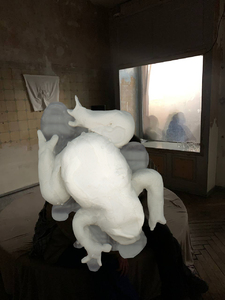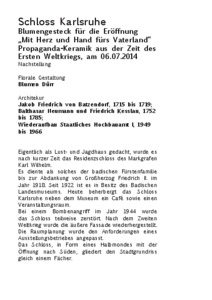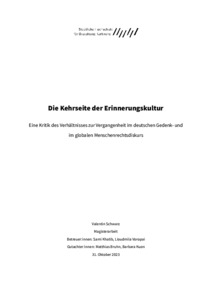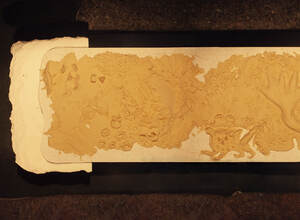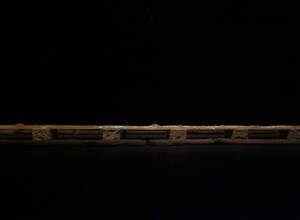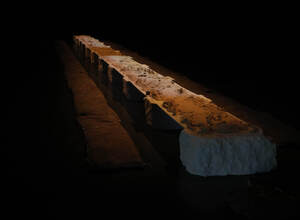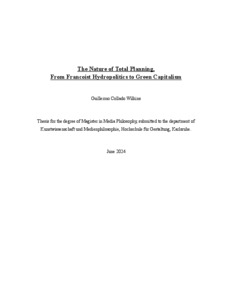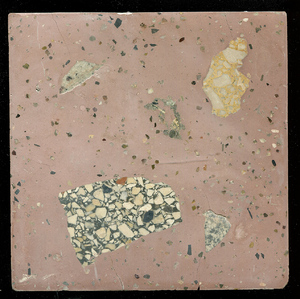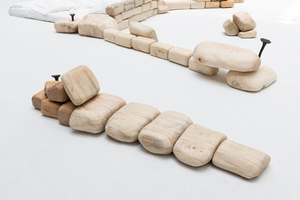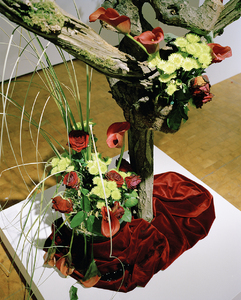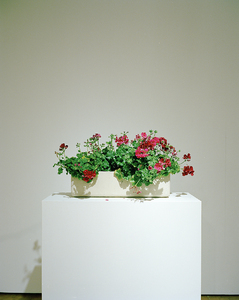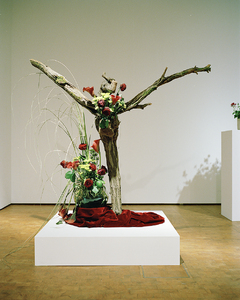"Social-Media-Kanäle der HfG"
| Begriff | Social-Media-Kanäle der HfG |
| Metakey | Freigabe Nutzung HfG (rights:usage_hfg) |
| Typ | Keyword |
| Vokabular | Rechte |
898 Inhalte
- Seite 1 von 75
toad (dt.: kröte)
- Titel
- toad (dt.: kröte)
- Titel
- toad (dt.: kröte)
- Titel (en)
- toad
- Urheberrechtshinweis
- © Hanna Franke
- Rechtsschutz/Lizenz
- Freigabe Nutzung HfG
- Beziehung/Funktion
- Alternativ-Text (de)
- Freigestelltes Objekt: Helle Kröte aus Keramik, die mit einer Schicht Wachs überzogen ist. Im Hintergrund ein dunkler Raum. Ein Stoff hängt an der Wand, Personen sind hinter einer Fensterscheibe zu erkennen.
- Alternativ-Text (en)
- Isolated object: Light-colored ceramic toad covered with a layer of wax. A dark room in the background. A fabric hangs on the wall, people can be seen behind a window pane.
- Projektleiter/in
- Semester
- Studiengang
- Typ der Abschlussarbeit
- Importiert am
- 02.11.2024
- Übergeordnete Sets
- 1
Titelkarten
- Titel
- Titelkarten
- Autor/in
- Kategorie
- Typ des Projekts/Werks
- Schlagworte
- Titel
- Titelkarten
- Urheberrechtshinweis
- © Johanna Hoth
- Rechtsschutz/Lizenz
- Freigabe Nutzung HfG
- Medienersteller/in
- Beziehung/Funktion
- Medien-Beschreibung
- Mehrseitiges PDF
- Semester
- Studiengang
- Typ der Abschlussarbeit
- Importiert am
- 30.07.2024
- Übergeordnete Sets
- 1
Titelblatt zu "Die Kehrseite der Erinnerungskultur"
- Titel
- Titelblatt zu "Die Kehrseite der Erinnerungskultur"
- Autor/in
- Kategorie
- Typ des Projekts/Werks
- Schlagworte
- Datierung
- 31.10.2023
- Bemerkungen
- Eine kondensierte Fassung des Textes wurde von "Umbau" veröffentlicht: https://umbau.hfg-karlsruhe.de/posts/die-kehrseite…
- Titel
- Titelblatt zu "Die Kehrseite der Erinnerungskultur"
- Titel (en)
- Cover sheet "The Other Side of Erinnerungskultur"
- Urheberrechtshinweis
- © Valentin Schwarz
- Freigabe Nutzung HfG
- Medienersteller/in
- Beziehung/Funktion
- Medien-Beschreibung
- In dieser Arbeit setze ich mich mit unterschiedlichen Geschichtsbegriffen auseinander. Dafür dienen mir die Diskussionen um die deutsche Erinnerungskultur als Einstiegspunkt. Das Ziel ist es allerdings nicht, unmittelbar in die polarisierte Debatte einzugreifen. Stattdessen richtet sich der Fokus auf das ideologische Fundament, das verschiedenen Formen, mit der eigenen Geschichte umzugehen, zugrunde liegt. Den theoretischen roten Faden bildet das Werk "After Evil" des Philosophen Robert Meister. Darin kritisiert er die Haltung, die Vergangenheit zwar als schlimm zu verurteilen, aber gleichzeitig auch als abgetrennt von der Gegenwart zu betrachten. Herausgearbeitet werden die Argumente unter anderem anhand von Filmen von Alexander Kluge und Harun Farocki
- Medien-Beschreibung (en)
- In this work, I examine different concepts of history. The discussions surrounding the German culture of remembrance serve as my starting point. However, the aim is not to intervene directly in the polarized debate. Instead, the focus is on the ideological foundations that underlie different ways of dealing with one's own history. The work “After Evil” by philosopher Robert Meister forms the theoretical leitmotif. In it, he criticizes the position of condemning the past as evil, but treating it at the same as something that is separated from the present. The arguments are elaborated on the basis of films by Alexander Kluge and Harun Farocki, among others.
- Projektleiter/in
- Semester
- Studiengang
- Typ der Abschlussarbeit
- Importiert am
- 15.06.2024
- Übergeordnete Sets
- 1
Tisch von oben
- Titel
- Tisch von oben
- Autor/in
- Kategorie
- Typ des Projekts/Werks
- Schlagworte
- Datierung
- Februar 2023
- Titel
- Tisch von oben
- Urheberrechtshinweis
- © Saskia van der Meer
- Freigabe Nutzung HfG
- Medienersteller/in
- Medien-Beschreibung
- Sand nach der dritten Aufführung der Reading Performance.
- Projektleiter/in
- Semester
- Studiengang
- Typ der Abschlussarbeit
- Importiert am
- 05.10.2024
- Übergeordnete Sets
- 1
Tisch der Reading Performance
- Titel
- Tisch der Reading Performance
- Autor/in
- Kategorie
- Typ des Projekts/Werks
- Schlagworte
- Datierung
- Februar 2023
- Titel
- Tisch der Reading Performance
- Urheberrechtshinweis
- © Saskia van der Meer
- Freigabe Nutzung HfG
- Medienersteller/in
- Projektleiter/in
- Semester
- Studiengang
- Typ der Abschlussarbeit
- Importiert am
- 05.10.2024
- Übergeordnete Sets
- 1
Tisch der Reading Performance
- Titel
- Tisch der Reading Performance
- Autor/in
- Kategorie
- Typ des Projekts/Werks
- Schlagworte
- Datierung
- Februar 2023
- Titel
- Tisch der Reading Performance
- Urheberrechtshinweis
- © Saskia van der Meer
- Freigabe Nutzung HfG
- Medienersteller/in
- Projektleiter/in
- Semester
- Studiengang
- Typ der Abschlussarbeit
- Importiert am
- 05.10.2024
- Übergeordnete Sets
- 1
The Nature of Total Planning, From Francoist Hydropolitics to Green Capitalism
- Titel
- The Nature of Total Planning, From Francoist Hydropolitics to Green Capitalism
- Autor/in
- Beschreibung (de)
- Magisterarbeit in Medienphilosophie
- Beschreibung (en)
- Thesis for the degree of Magister in Media Philosophy
- Kategorie
- Schlagworte
- Datierung
- 06.06.2024
- Sprache
- Ort: Institution
- Land
- Titel
- The Nature of Total Planning, From Francoist Hydropolitics to Green Capitalism
- Titel (en)
- The Nature of Total Planning, From Francoist Hydropolitics to Green Capitalism
- Urheberrechtshinweis
- © Guillermo Collado Wilkins
- Rechtsschutz/Lizenz
- Freigabe Nutzung HfG
- Medienersteller/in
- Medien-Beschreibung (en)
- This paper provides a critical examination of ecological planning based on the continuities that it displays across seemingly disparate political projects and historical periods. In order to do so, it draws on the small rural valley of La Bizkaia in Navarre, Spain. It produces an environmental history of the valley through a detailed study of its hydro-forestry resources, periodising such history according to a materialist reading of its ‘metabolic regimes’. That is to say, through the particular configurations between the natural and social orders that dictate life in La Bizkaia.
Initially, the study introduces the valley’s natural characteristics and its property structure, laying the foundations upon which the rest of this paper sits. Subsequently, it undertakes a detailed investigation of Francoist interventions in the 1940s-60s; a massive monoculture of pine trees was planted by the Francoist Forestry Council, which radically undermined La Bizkaia’s natural systems and depopulated it. This paper thus analyses the planning logic behind this natural intervention which, borrowing a term from one of its draftsmen, is named ‘total planning’.
The thesis then explores contemporary management of the valley by the Government of Navarre, which has maintained ownership until this day, aligning its plans with the international protocols and standards characteristic of green capitalism. By looking at projects undertaken in the valley for nature conservation and climate change adaptation, which receive funding from the European Union, this research reveals the continuities between Francoist policies and green capitalism, and how both operate under the logic of Total Planning. Under this planning logic, they both fail to accommodate the unpredictability of political conflict and natural systems.
Planning thus serves as a lens to explore the political and epistemological dimensions of ecological thought, placing a materialist reading of a small case study into the broader context of contemporary ecological intervention.
- This paper provides a critical examination of ecological planning based on the continuities that it displays across seemingly disparate political projects and historical periods. In order to do so, it draws on the small rural valley of La Bizkaia in Navarre, Spain. It produces an environmental history of the valley through a detailed study of its hydro-forestry resources, periodising such history according to a materialist reading of its ‘metabolic regimes’. That is to say, through the particular configurations between the natural and social orders that dictate life in La Bizkaia.
- Alternativ-Text (de)
- Vollständiger Text der Magisterarbeit
- Alternativ-Text (en)
- Complete text of the Magisterarbeit
- Projektleiter/in
- Semester
- Studiengang
- Typ der Abschlussarbeit
- Importiert am
- 22.10.2024
- Übergeordnete Sets
- 0
Terrazzofliesen
- Titel
- Terrazzofliesen
- Autor/in
- Kategorie
- Schlagworte
- Titel
- Terrazzofliesen
- Titel (en)
- Terrazzo tiles
- Urheberrechtshinweis
- ©Leonie Mühlen
- Rechtsschutz/Lizenz
- Freigabe Nutzung HfG
- Medienersteller/in
- Beziehung/Funktion
- Medien-Beschreibung
- Terrazzofliesen
25 Stk, 20 x 20 x 2cm, Zement, diverse Zuschlagstoffe
- Terrazzofliesen
- Medien-Beschreibung (en)
- Terrazzo tiles
25 pcs, 20 x 20 x 2cm, cement, various aggregates
- Terrazzo tiles
- Projektleiter/in
- Semester
- Studiengang
- Typ der Abschlussarbeit
- Importiert am
- 17.06.2024
- Übergeordnete Sets
- 1
Tagesbett
- Titel
- Tagesbett
- Autor/in
- Kategorie
- Schlagworte
- Material
- Ort: Institution
- Ort
- Lichthof 3
- Stadt
- Land
- Beteiligte Institution(en)
- Titel
- Tagesbett
- Urheberrechtshinweis
- © Florian Knöbl
- Rechtsschutz/Lizenz
- Freigabe Nutzung HfG
- Beziehung/Funktion
- Projektleiter/in
- Semester
- Studiengang
- Typ der Abschlussarbeit
- Importiert am
- 20.10.2024
- Übergeordnete Sets
- 1
Tag 5
- Titel
- Tag 5
- Autor/in
- Kategorie
- Typ des Projekts/Werks
- Schlagworte
- Titel
- Tag 5
- Titel (en)
- Day 5
- Urheberrechtshinweis
- © Johanna Hoth, Wataru Murakami
- Rechtsschutz/Lizenz
- Freigabe Nutzung HfG
- Medienersteller/in
- Beziehung/Funktion
- Semester
- Studiengang
- Typ der Abschlussarbeit
- Importiert am
- 30.07.2024
- Übergeordnete Sets
- 1
Tag 5
- Titel
- Tag 5
- Autor/in
- Kategorie
- Typ des Projekts/Werks
- Schlagworte
- Titel
- Tag 5
- Titel (en)
- Day 5
- Urheberrechtshinweis
- © Johanna Hoth, Wataru Murakami
- Rechtsschutz/Lizenz
- Freigabe Nutzung HfG
- Medienersteller/in
- Beziehung/Funktion
- Semester
- Studiengang
- Typ der Abschlussarbeit
- Importiert am
- 30.07.2024
- Übergeordnete Sets
- 1
Tag 5
- Titel
- Tag 5
- Autor/in
- Kategorie
- Typ des Projekts/Werks
- Schlagworte
- Titel
- Tag 5
- Titel (en)
- Day 5
- Urheberrechtshinweis
- © Johanna Hoth, Wataru Murakami
- Rechtsschutz/Lizenz
- Freigabe Nutzung HfG
- Medienersteller/in
- Beziehung/Funktion
- Semester
- Studiengang
- Typ der Abschlussarbeit
- Importiert am
- 30.07.2024
- Übergeordnete Sets
- 1
